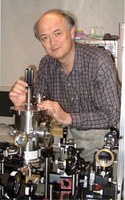 That's the view of Rashid A. Ganeev (TWAS Fellow 2008), principal scientist at the Uzbekistan Academy of Sciences’ Institute of Electronics in the capital city of Tashkent. Ganeev recently visited Trieste to attend the Abdus Salam International Centre for Theoretical Physics (ICTP) Summer College on Plasma Physics.
That's the view of Rashid A. Ganeev (TWAS Fellow 2008), principal scientist at the Uzbekistan Academy of Sciences’ Institute of Electronics in the capital city of Tashkent. Ganeev recently visited Trieste to attend the Abdus Salam International Centre for Theoretical Physics (ICTP) Summer College on Plasma Physics.
“The fall of the Soviet Union,” Ganeev notes, “led to a decline in funding for science in Uzbekistan and the other former Soviet republics in Central Asia.” Scant access to scientific publications and limited opportunities for scientific exchange added to the declining fortunes of scientists in the region. “Only a few fields of study in natural sciences retained high levels of international excellence," he says. These fields included laser physics, astronomy, nuclear physics and mathematics. Each held a privileged position during the Soviet period.
The steep decline in science that characterized the years following the demise of the Soviet Union has now passed. But serious problems persist. Uzbekistan, Ganeev notes, "spent only around 0.5% of its gross domestic product (GDP) on science in 2000, and this percentage has basically stayed the same for a decade.” As a result, salaries for scientists remain meagre and funding for laboratory supplies and equipment inadequate. “The equipment that I use for my experiments in laser physics,” he says, “was purchased in the 1980s. Needless to say, the technology has changed a great deal since then.” Low salaries and poor working conditions not only undermine the efforts of today’s researchers, but also discourage students from pursuing careers in science.
Despite such difficulties, “there are glimmers of hope,” says Ganeev. “For example, access to international journals at the Institute of Electronics, where I work, is now available, thanks largely to programmes such as ICTP’s e-Journals Delivery Service and IOP’s EJ subscription.”
“International collaboration is continuing and slowly increasing,” he adds. For example, researchers in his institute are not only working with scientists in Kazakhstan and Kyrgyzstan but also with colleagues in Germany, Canada, India, Japan and South Korea. “I hope that this trend will become even more prominent in the future.”
Scientists throughout Central Asia welcome such advances. But Ganeev quickly notes that long-term, sustained progress will only occur when governments throughout the region make science-based development a national priority, and provide sufficient funds to ensure that scientists can pursue careers that both meet their personal ambitions and help improve the economic and social well-being of their fellow citizens.
Ganeev’s research focuses on laser plasma physics and, more specifically, on nonlinear optics. He has been a visiting professor and senior associate at the Standards and Industrial Research Institute in Malaysia, the Centre for Advanced Technology in India, the Institute of Solid State Physics in Japan, and the National Institute of Scientific Research in Canada. He is a member of the Optical Society of America and has received the International Commission for Optics’ Galileo Galilei Medal.

